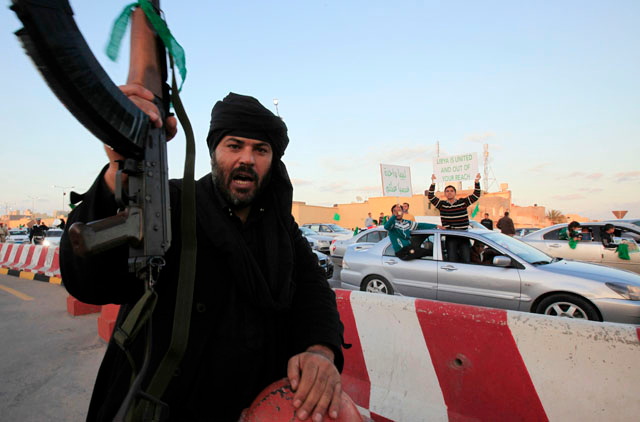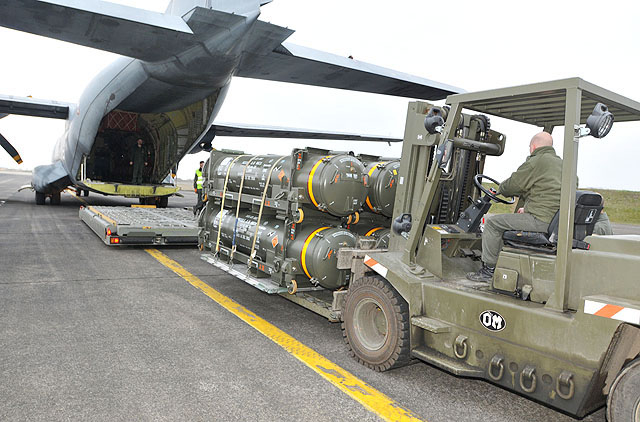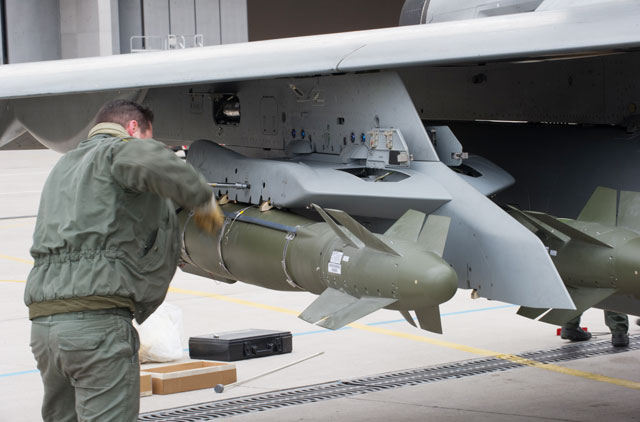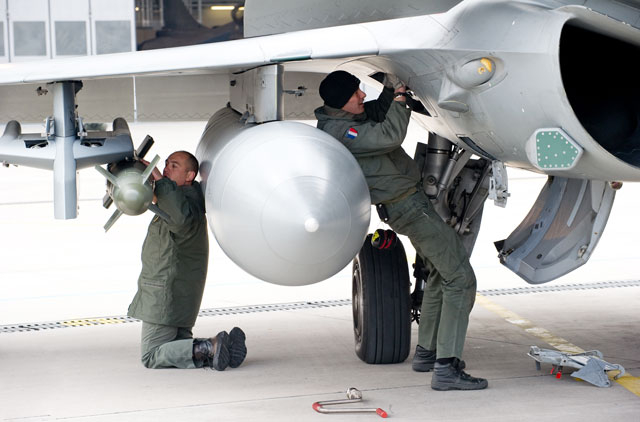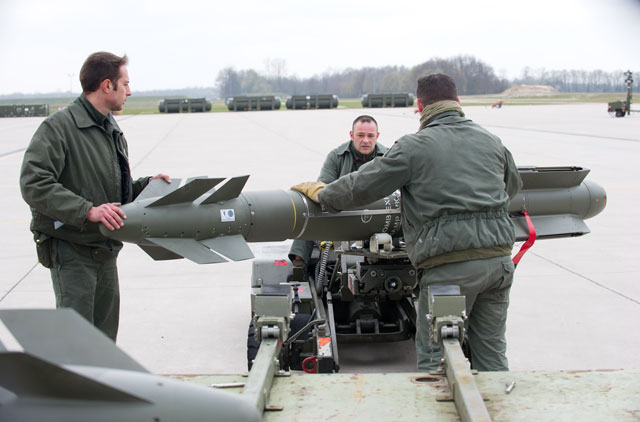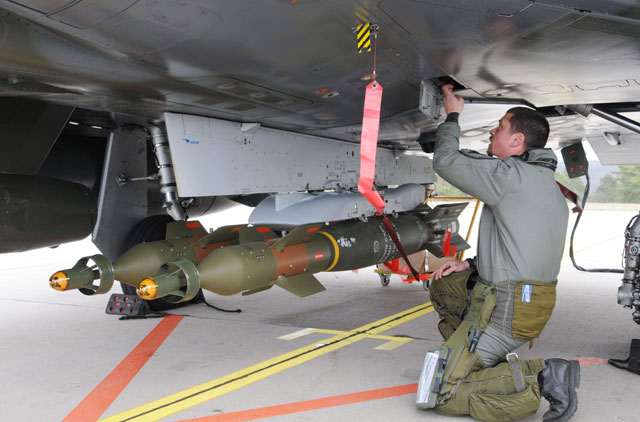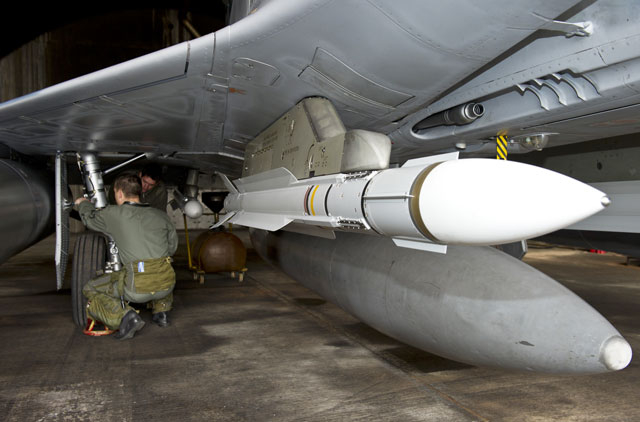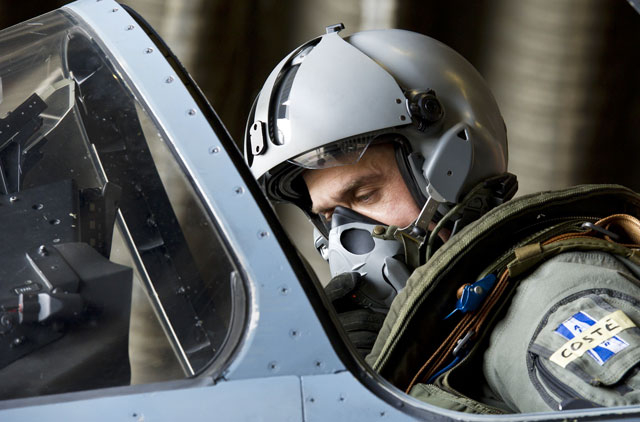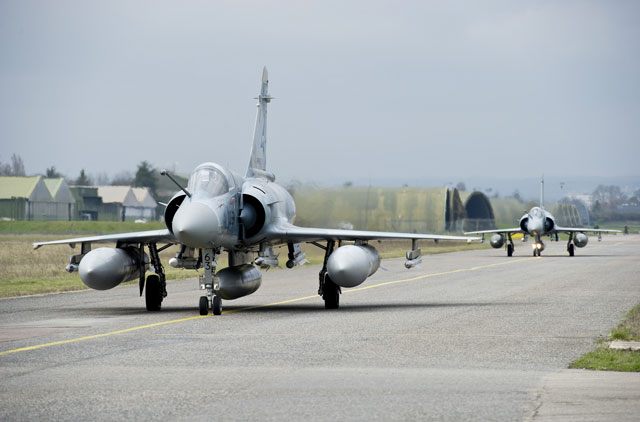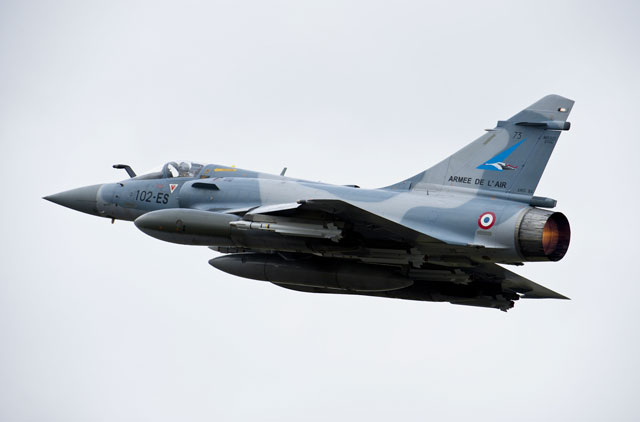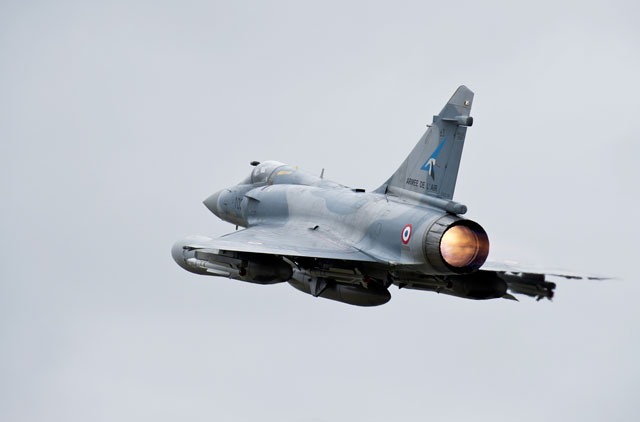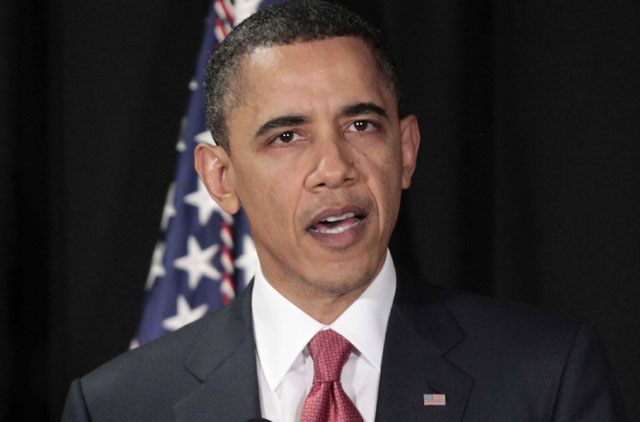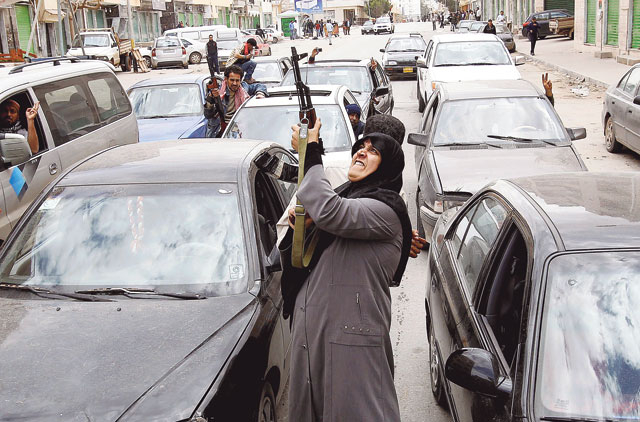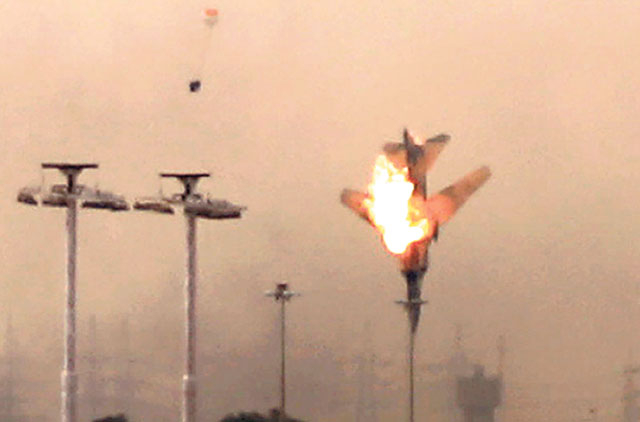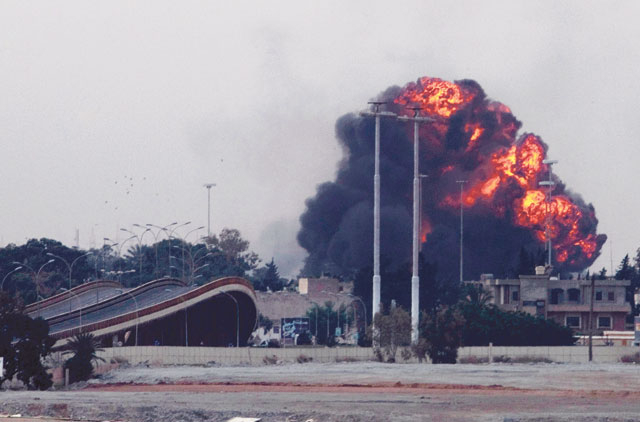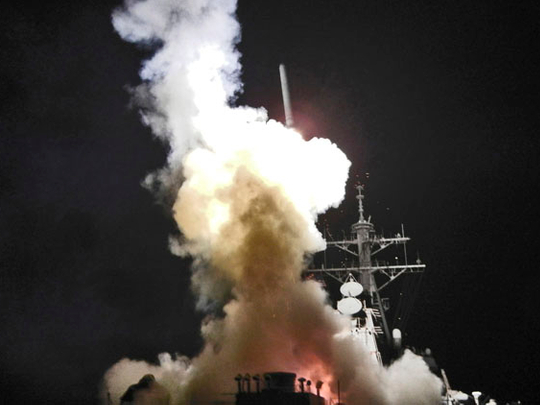
Paris: France deployed "more than 15 aircraft" that took part in ground strikes on Sunday, said a spokesman for the military's general staff, Colonel Thierry Burkhard.
Meanwhile, Libya's government has begun distributing arms to more than one million people and will complete the operation within hours, the state news agency reported on Sunday.
Jana news agency quoted sources in Libya's defence ministry as saying they "expected the operation to end in the next hours to arm more than a million men and women".
Earlier Sunday a defiant Muammar Gaddafi said he would arm civilians to defend Libya from what he called "colonial, crusader" aggression by Western forces that have launched air strikes against him.
The statement came as the United States and allied forces effectively established a no-fly zone over Libya and halted an offensive by Gaddafi's forces on rebels in Benghazi.
"It is now necessary to open the stores and arm all the masses with all types of weapons to defend the independence, unity and honour of Libya," Gaddafi said in an audio message broadcast on state television hours after the strikes began.
He said Libya would exercise its right to self defence, adding the Mediterranean and North Africa were now a battleground.
"The interests of countries face danger from now on in the Mediterranean because of this aggressive and mad behaviour," he said.
Dozens dead in Benghazi attack
At least 24 bodies of fighters and civilians, many burnt beyond recognition, lay in the morgue of Benghazi's main hospital on Sunday. Forces loyal to Gaddafi assaulted the rebels' eastern stronghold on Saturday.
However, medicas and AFP correspondents reported that at least 94 people were killed in the assault.
Air strikes
The US, Britain and France pounded Libya with Tomahawk missiles and air strikes into the early hours of Sunday, sparking fury from Gaddafi.
In the biggest Western intervention in the Arab world since the 2003 US-led invasion of Iraq, American warships and a British submarine fired at least 110 Tomahawk cruise missiles into Libya on Saturday, the US military said.
Admiral William Gortney told reporters at the Pentagon the cruise missiles "struck more than 20 integrated air defence systems and other air defence facilities ashore."
Libyan state TV claimed 48 people had been killed in the attacks, but the report could not be independently verified. It also said there had been a fresh wave of strikes on Tripoli early on Sunday. There was no way to independently verify the claims.
Bombs were dropped early on Sunday near Bab Al Aziziyah, Gaddafi's Tripoli headquarters, prompting barrages of anti-aircraft fire from Libyan forces that lasted about 40 minutes.
State television had earlier said hundreds of people had gathered to serve as human shields at Bab Al Aziziyah and at the capital's international airport.
Gaddafi, in a brief audio message broadcast on state television, fiercely denounced the attacks as a "barbaric, unjustified Crusaders' aggression."
He vowed retaliatory strikes on military and civilian targets in the Mediterranean, which he said had been turned into a "real battlefield."
"Now the arms depots have been opened and all the Libyan people are being armed," to fight against Western forces, the veteran leader warned.
French fighter jets fired the first salvos, carrying out several strikes in the rebel-held east, while British fighter jets also bombarded the North African nation.
The strikes, which were aimed at enforcing a UN-mandated no-fly zone, were a sharp escalation in the international effort to stop Gaddafi after weeks of pleading by the rebels, who have seen early gains reversed as the regime unleashed the full force of its superior air power and weaponry.
No US ground troops
President Barack Obama said military action was not his first choice and reiterated that he would not send American ground troops to Libya.
"This is not an outcome the US or any of our partners sought," Obama said from Brazil, where he is starting a five-day visit to Latin America. "We cannot stand idly by when a tyrant tells his people there will be no mercy."
Explosions continued to rock the coastal cities, including Tripoli, where anti-aircraft guns could be heard firing overnight.
Libyan TV quoted the armed forces command as saying 48 people were killed and 150 wounded in the allied assault. It said most of the casualties were children but gave no more details.
The International Committee of the Red Cross said it was "deeply concerned" about civilians' safety and called on all sides "to abide strictly by the rules and principles of international humanitarian law" by distinguishing between civilians and fighters and allowing safe access for humanitarian organisations.
'Unjustified action'
Gaddafi, who has ruled Libya for 41 years, said in a telephone call to Libyan state TV that he was opening weapons depots to allow his people to arm themselves in defence.
He said the international action against his forces was unjustified, calling it "simply a colonial crusader aggression that may ignite another largescale crusader war".
He also said the UN Security Council and the international community were responsible for "stopping this unjust flagrant aggression against a sovereign country immediately".
His regime also acted quickly in the run-up to the strikes, sending warplanes, tanks and troops into the eastern city of Benghazi, the rebel capital and first city to fall to the rebellion that began February 15. Then the government attacks appeared to go silent.
Operation Odyssey Dawn
Operation Odyssey Dawn, as the allied assault has been dubbed, followed an emergency summit in Paris during which the 22 leaders and top officials agreed to do everything necessary to make Gaddafi respect a UN Security Council resolution Thursday calling for the no-fly zone and demanding a ceasefire, French President Nicolas Sarkozy said.
"Our consensus was strong, and our resolve is clear. The people of Libya must be protected, and in the absence of an immediate end to the violence against civilians our coalition is prepared to act, and to act with urgency," Obama said earlier.
Navy Vice Admmiral William E. Gortney, director of the Pentagon's Joint Staff, told reporters in Washington that US ships and a British submarine had launched the first phase of a missile assault on Libyan air defences to clear the way for the imposition of a UN-mandated no-fly zone over the North African country.
Gortney said the mission has two goals: prevent further attacks by Libyan forces on rebels and civilians, and degrade the Libyan military's ability to contest a no-fly zone.
Mohammad Ali, a spokesman for the exiled opposition group the Libyan Salvation Front, said the Libyan air force headquarters at the Mateiga air base in eastern Tripoli and the Aviation Academy in Misrata had been targeted.
About 20 French fighter jets carried out "several strikes" earlier Saturday, military spokesman Thierry Burkhard told The Associated Press. He said earlier that one of the planes had fired the first shot against a Libyan military vehicle.
"All our planes have returned to base tonight," he said, and denied a Libyan TV report that a French plane had been hit. He would not elaborate on what was hit or where, but said French forces are focusing on the Benghazi area and US forces are focused in the west.
The US has struck Libya before. Former President Reagan launched US airstrikes on Libya in 1986 after a bombing at a Berlin disco - which the US blamed on Libya - that killed three people, including two American soldiers.
The airstrikes killed about 100 people in Libya, including Gaddafi's young adopted daughter at his Tripoli compound.
Libyan regime official Mohammad Al Zwei said a large number of civilians were injured when several civilian and military sites in the capital, Tripoli, and the nearby city of Misrata were hit.
He also reiterated the Libyan allegation that the rebels were linked to Al Qaida. There was no way to independently verify the claims.
The rebels said earlier that they had hoped for more, sooner from the international community, after a day when crashing shells shook the buildings of Benghazi and Gaddafi's tanks rumbled through the university campus.
A doctor said 27 bodies had reached hospitals by midday. As night fell, though, the streets grew quiet.
Libyan state television also showed Gaddafi supporters converging on the international airport and a military garrison in Tripoli, and the airport in Gaddafi's hometown of Sirte, in an apparent attempt to deter bombing.
In an open letter, Gaddafi warned: "You will regret it if you dare to intervene in our country."
Military buildup
Warplanes from the United States, Canada, Denmark arrived at Italian air bases Saturday as part of an international military buildup. Germany backed the operation but isn't offering its own forces.
The British defence secretary, Liam Fox, said in a statement that Tornado GR4 fast jets flew 4,800 kilometres from Royal Air Force Station Marham in Norfolk, England, and back, making it the RAF's longest-range bombing mission since the 1982 Falklands conflict.
The jets launched Stormshadow missiles, while a Trafalgar submarine launched Tomahawk cruise missiles.
HMS Westminster was off the Libyan coast and HMS Cumberland was in the region, while Typhoon aircraft were standing by, the statement said.


